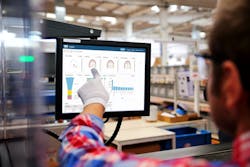Eight ways smart manufacturing is moving into the mainstream in 2021
In the past year, smart manufacturing has moved from theoretical strategies to pragmatic best practices as plastics manufacturers and molders navigate unpredictable shifts in market demand, supply chain resources and workforce availability — along with new demands for workplace safety. No longer “bleeding edge,” many smart manufacturing tactics and technologies have now moved into mainstream adoption. Eight developments in particular will play a central role in driving plastics manufacturers’ and molders’ success in 2021.
1. Adapting factory designs with smart manufacturing technologies is the highest priority.
As plastics manufacturers look to balance on-site and virtual work teams, adapting factory designs with smart manufacturing technologies will be the highest priority in 2021. Unable to recruit enough hourly workers, manufacturers will invest in robotics for diverse, repetitive tasks on the shop floor. Automated processes, from end-of-arm assembly to performing labeling, pick and place, packaging, stacking and palletizing will help mitigate recurring labor shortages. At the same time, remote monitoring via sensors and smart machines will help managers, engineers and other skilled employees to identify potential issues whether working from home or from a control center — bringing staff onsite to troubleshoot only on an as-needed basis.
2. Quoting and pricing get a makeover.
Manufacturers will move into more digital channels in 2021, making a streamlined process to configure, price and quote (CPQ) a competitive advantage. Using CPQ software, manufacturers are gaining greater channel visibility and enabling more visually compelling quotes of custom-configured products using 3-D images to speed time to market. At the same time, CPQ functionality improves price management and control across channels, increasing margins and reducing order errors in the process. Foundational to success with CPQ will be adopting design-to-manufacturing, which further accelerates time to market by speeding up new product development cycles, improving product quality and increasing yield rates.
3. Real-time production and process monitoring take on a new role in risk management.
Manufacturers will increase their use of real-time process and production monitoring to assess and reduce risk through visibility into real-time consumption, quality and production efficiency. Smart manufacturing technologies are making it possible to parse or slice data at a more granular level for varying frequencies and sampling rates, which can then be used to drive statistical process control (SPC). Collectively, the insights gained serve as an early-warning system of factors that could impact revenue and margins. Knowing that every machine, process and system is operating and stable brings greater stability to production and revenue forecasts and, ultimately, financial results.
4. The need to shift quickly between manufacturing process styles is accelerating.
Rapidly changing market dynamics mean the ability to shift quickly from one manufacturing process style to another and manufacture new products in days will be much sought-after strengths in 2021. One digital innovation is having more intuitive, touch-screen-based shop floor interfaces to interact with enterprise resource planning (ERP) and manufacturing execution system (MES) solutions. Another is having digital work center consoles that guide, record and inform workers so they can quickly step into a work center, know what to do and how to do it, and take whatever manual actions might be necessary to complete a particular production run. This enables plastics manufacturers and molders to handle more short-notice production runs across a broader customer base while launching new products of their own.
5. IoT is becoming mainstream.
Smart sensors and low-cost, low-power edge devices capable of capturing a greater variety and volume of data are becoming part of mainstream production monitoring workflows. Three factors will be catalysts for the growing adoption of Internet of Things (IoT) and Industrial IoT (IIoT) technologies across manufacturing in 2021. The first is how many more people will be working remotely, requiring real-time data on production processes and machinery status to do their jobs. The second is real-time process and production monitoring's adoption as a risk-reduction strategy and its many benefits for improving quality and production efficiency. And the third is extending the life of existing machines by retrofitting them with smart sensors that provide valuable data for improving production efficiency and product quality.
6. Predictive analytics are powered by more detailed data.
Making the transition to smart manufacturing begins with reliable data that provides manufacturers with new, often unexpected insights into increasing production efficiency and quality. The latest generation of smart manufacturing technologies can capture detailed data at randomized frequencies on machinery, yielding insights no one has seen before. Increasingly, this data is being used to drive predictive analytics that enable manufacturers to more accurately assess risks to production and improve financial visibility with highly accurate sales and margin forecasts.
7. Proven track-and-trace and supply chain visibility provide a competitive advantage.
Tier 1 suppliers and manufacturers are directing more orders to mid-tier suppliers that have proven track-and-trace and supply chain visibility expertise as they seek to reduce the risk of health-related interruptions to production. Seeking business continuity during uncertain times, many companies are reshoring their supply chains, and suppliers are collaborating with manufacturers on meeting anticipated audit, health and safety requirements. As a result, companies can enjoy a significant competitive edge from demonstrating the ability to provide proof via track-and-traceability that inbound supplier shipments to a manufacturing facility are clean, COVID-19 free and in compliance with health and safety regulations.
8. Sustainability in manufacturing operations is gaining momentum.
The financial benefits of adopting sustainable practices, combined with customers’ regulatory requirements to achieve greater sustainability, are motivating plastics manufacturers and molders to advance their own sustainability initiatives. Many companies are purchasing new smart machinery and replacing hydraulic modeling machines with electric ones that reduce both energy consumption and costs. Forward-thinking manufacturers are also taking a holistic approach to sustainability that starts with their suppliers and progresses through process redesign to reduce waste, followed by packaging and product lifecycle improvements to further accelerate sustainability across manufacturing operations. Design-for-sustainability is further motivating manufacturers to create new biodegradable products, lighter-weight products and recyclable packaging materials.
Conclusion
Robotics and automated production form one area of smart manufacturing. However, the far greater focus for plastics manufacturers and molders will be on using technology not to replace employees but instead to enhance their decision-making, productivity, monitoring and management by harnessing real-time data from smart machines, sensors and other sources. By moving to this new, more data-centric model, manufacturers are more effectively navigating shifts in market demand, supply chain resources, worker availability and safety requirements. This, in turn, is enabling them to provide the consistently high level of service and quality products that drive customer loyalty, improve profitability and grow business.
Louis Columbus is principal of DELMIAworks, which provides ERP systems tailored for factory environments to streamline processes across sales, order processing, finance, human resources, planning, production, inventory, procurement and more. His previous positions include product management at Ingram Cloud, product marketing at iBASEt, Plex Systems, senior analyst at AMR Research (now Gartner), marketing and business development at Cincom Systems, Ingram Micro, a SaaS start-up and at hardware companies. He is also a member of the Enterprise Irregulars. Professional experience includes marketing, product management, sales and industry analyst roles in the enterprise software and IT industries. His academic background includes a Master of Business Administration degree from Pepperdine University and completion of the Strategic Marketing Management and Digital Marketing Programs at the Stanford University Graduate School of Business. He teaches MBA courses in international business, global competitive strategies, international market research and capstone courses in strategic planning and market research, and has taught at California State University, Fullerton: University of California, Irvine; Marymount University; and Webster University. You can reach him on Twitter at @LouisColumbus.

